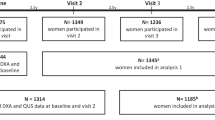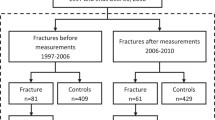Abstract
Summary
The relationship between bone quantitative ultrasound (QUS) and fracture risk was estimated in an individual level data meta-analysis of 9 prospective studies of 46,124 individuals and 3018 incident fractures. Low QUS is associated with an increase in fracture risk, including hip fracture. The association with osteoporotic fracture decreases with time.
Introduction
The aim of this meta-analysis was to investigate the association between parameters of QUS and risk of fracture.
Methods
In an individual-level analysis, we studied participants in nine prospective cohorts from Asia, Europe and North America. Heel broadband ultrasonic attenuation (BUA dB/MHz) and speed of sound (SOS m/s) were measured at baseline. Fractures during follow-up were collected by self-report and in some cohorts confirmed by radiography. An extension of Poisson regression was used to examine the gradient of risk (GR, hazard ratio per 1 SD decrease) between QUS and fracture risk adjusted for age and time since baseline in each cohort. Interactions between QUS and age and time since baseline were explored.
Results
Baseline measurements were available in 46,124 men and women, mean age 70 years (range 20–100). Three thousand and eighteen osteoporotic fractures (787 hip fractures) occurred during follow-up of 214,000 person-years. The summary GR for osteoporotic fracture was similar for both BUA (1.45, 95 % confidence intervals (CI) 1.40–1.51) and SOS (1.42, 95 % CI 1.36–1.47). For hip fracture, the respective GRs were 1.69 (95 % CI, 1.56–1.82) and 1.60 (95 % CI, 1.48–1.72). However, the GR was significantly higher for both fracture outcomes at lower baseline BUA and SOS (p < 0.001). The predictive value of QUS was the same for men and women and for all ages (p > 0.20), but the predictive value of both BUA and SOS for osteoporotic fracture decreased with time (p = 0.018 and p = 0.010, respectively). For example, the GR of BUA for osteoporotic fracture, adjusted for age, was 1.51 (95 % CI 1.42–1.61) at 1 year after baseline, but at 5 years, it was 1.36 (95 % CI 1.27–1.46).
Conclusions
Our results confirm that quantitative ultrasound is an independent predictor of fracture for men and women particularly at low QUS values.



Similar content being viewed by others
References
Kanis JA (2008) On behalf of the WHO scientific group. Assessment of osteoporosis at the primary health-care level. Technical report. WHO Collaborating Centre, University of Sheffield, UK, Sheffield
Kanis JA (2002) Diagnosis of osteoporosis and assessment of fracture risk. Lancet 359(9321):1929–1936
Kanis JA, Borgstrom F, De Laet C et al (2005) Assessment of fracture risk. Osteoporos Int 16(6):581–589
Kanis JA, Johnell O, Oden A, Johansson H, McCloskey E (2008) FRAX and the assessment of fracture probability in men and women from the UK. Osteoporos Int 19(4):385–397
Kanis JA, McCloskey EV, Johansson H, Oden A, Melton LJ 3rd, Khaltaev N (2008) A reference standard for the description of osteoporosis. Bone 42(3):467–475
Hernlund E, Svedbom A, Ivergard M et al (2013) Osteoporosis in the European Union: medical management, epidemiology and economic burden. A report prepared in collaboration with the International Osteoporosis Foundation (IOF) and the European Federation of Pharmaceutical Industry Associations (EFPIA). Arch Osteoporos 8(1–2):136
Bauer DC, Ewing SK, Cauley JA, Ensrud KE, Cummings SR, Orwoll ES (2007) Quantitative ultrasound predicts hip and non-spine fracture in men: the MrOS study. Osteoporos Int 18(6):771–777
Bauer DC, Gluer CC, Cauley JA et al (1997) Broadband ultrasound attenuation predicts fractures strongly and independently of densitometry in older women. A prospective study. Study of osteoporotic fractures research group. Arch Intern Med 157(6):629–634
Dargent-Molina P, Schott AM, Hans D et al (1999) Separate and combined value of bone mass and gait speed measurements in screening for hip fracture risk: results from the EPIDOS study. Epidemiologie de l’Osteoporose. Osteoporos Int 9(2):188–192
Diez-Perez A, Gonzalez-Macias J, Marin F et al (2007) Prediction of absolute risk of non-spinal fractures using clinical risk factors and heel quantitative ultrasound. Osteoporos Int 18(5):629–639
Fujiwara S, Sone T, Yamazaki K et al (2005) Heel bone ultrasound predicts non-spine fracture in Japanese men and women. Osteoporos Int 16(12):2107–2112
Gnudi S, Ripamonti C, Malavolta N (2000) Quantitative ultrasound and bone densitometry to evaluate the risk of nonspine fractures: a prospective study. Osteoporos Int 11(6):518–523
Hans D, Dargent-Molina P, Schott AM et al (1996) Ultrasonographic heel measurements to predict hip fracture in elderly women: the EPIDOS prospective study. Lancet 348(9026):511–514
Hollaender R, Hartl F, Krieg MA et al (2009) Prospective evaluation of risk of vertebral fractures using quantitative ultrasound measurements and bone mineral density in a population-based sample of postmenopausal women: results of the Basel Osteoporosis Study. Ann Rheum Dis 68(3):391–396
Huang C, Ross PD, Yates AJ et al (1998) Prediction of fracture risk by radiographic absorptiometry and quantitative ultrasound: a prospective study. Calcif Tissue Int 63(5):380–384
Khaw KT, Reeve J, Luben R et al (2004) Prediction of total and hip fracture risk in men and women by quantitative ultrasound of the calcaneus: EPIC-Norfolk prospective population study. Lancet 363(9404):197–202
Krieg MA, Cornuz J, Ruffieux C et al (2006) Prediction of hip fracture risk by quantitative ultrasound in more than 7000 Swiss women > or =70 years of age: comparison of three technologically different bone ultrasound devices in the SEMOF study. J Bone Miner Res 21(9):1457–1463
Marin F, Gonzalez-Macias J, Diez-Perez A, Palma S, Delgado-Rodriguez M (2006) Relationship between bone quantitative ultrasound and fractures: a meta-analysis. J Bone Miner Res 21(7):1126–1135
Moayyeri A, Adams JE, Adler RA et al (2012) Quantitative ultrasound of the heel and fracture risk assessment: an updated meta-analysis. Osteoporos Int 23(1):143–153
Pinheiro MM, Castro CM, Szejnfeld VL (2006) Low femoral bone mineral density and quantitative ultrasound are risk factors for new osteoporotic fracture and total and cardiovascular mortality: a 5-year population-based study of Brazilian elderly women. J Gerontol A Biol Sci Med Sci 61(2):196–203
Stewart A, Kumar V, Reid DM (2006) Long-term fracture prediction by DXA and QUS: a 10-year prospective study. J Bone Miner Res 21(3):413–418
Schousboe JT, Shepherd JA, Bilezikian JP, Baim S (2013) Executive summary of the 2013 international society for clinical densitometry position development conference on bone densitometry. J Clin Densitom 16(4):455–466
Heaney RP, Kanis JA (1996) The interpretation and utility of ultrasound measurements of bone. Bone 18(6):491–492
Gluer CC (1997) Quantitative ultrasound techniques for the assessment of osteoporosis: expert agreement on current status. The international quantitative ultrasound consensus group. J Bone Miner Res 12(8):1280–1288
Gluer CC, Barkmann R (2003) Quantitative ultrasound: use in the detection of fractures and in the assessment of bone composition. Curr Osteoporos Rep 1(3):98–104
Hans D, Krieg MA (2008) The clinical use of quantitative ultrasound (QUS) in the detection and management of osteoporosis. IEEE Trans Ultrason Ferroelectr Freq Control 55(7):1529–1538
Hans D, Durosier C, Kanis JA, Johansson H, Schott-Pethelaz AM, Krieg MA (2008) Assessment of the 10-year probability of osteoporotic hip fracture combining clinical risk factors and heel bone ultrasound: The EPISEM Prospective Cohort of 12958 Elderly Women. J Bone Miner Res
Schott AM, Cormier C, Hans D et al (1998) How hip and whole-body bone mineral density predict hip fracture in elderly women: the EPIDOS Prospective Study. Osteoporos Int 8(3):247–254
Lunt M, Felsenberg D, Adams J et al (1997) Population-based geographic variations in DXA bone density in Europe: the EVOS Study. European Vertebral Osteoporosis. Osteoporos Int 7(3):175–189
Lunt M, Felsenberg D, Reeve J et al (1997) Bone density variation and its effects on risk of vertebral deformity in men and women studied in thirteen European centers: the EVOS Study. J Bone Miner Res 12(11):1883–1894
O’Neill TW, Felsenberg D, Varlow J, Cooper C, Kanis JA, Silman AJ (1996) The prevalence of vertebral deformity in european men and women: the European Vertebral Osteoporosis Study. J Bone Miner Res 11(7):1010–1018
Kwok AW, Gong JS, Wang YX, et al (2012) Prevalence and risk factors of radiographic vertebral fractures in elderly Chinese men and women: results of Mr. OS (Hong Kong) and Ms. OS (Hong Kong) studies. Osteoporos Int
Blank JB, Cawthon PM, Carrion-Petersen ML et al (2005) Overview of recruitment for the osteoporotic fractures in men study (MrOS). Contemp Clin Trials 26(5):557–568
Orwoll E, Blank JB, Barrett-Connor E et al (2005) Design and baseline characteristics of the osteoporotic fractures in men (MrOS) study—a large observational study of the determinants of fracture in older men. Contemp Clin Trials 26(5):569–585
Gluer CC, Eastell R, Reid DM et al (2004) Association of five quantitative ultrasound devices and bone densitometry with osteoporotic vertebral fractures in a population-based sample: the OPUS Study. J Bone Miner Res 19(5):782–793
Stewart A, Felsenberg D, Eastell R, Roux C, Gluer CC, Reid DM (2006) Relationship between risk factors and QUS in a European population: the OPUS study. Bone 39(3):609–615
Krieg MA, Comuz J, Ruffieux C, Burckhardt P (2004) Role of bone ultrasound in predicting hip fracture risk in women 70 years or older: results of the SEMOF study and comparison with literature data. Rev Med Suisse Romande 124(2):59–62
Johansson H, Oden A, Johnell O et al (2004) Optimization of BMD measurements to identify high risk groups for treatment—a test analysis. J Bone Miner Res 19(6):906–913
McCloskey EV, Beneton M, Charlesworth D et al (2007) Clodronate reduces the incidence of fractures in community-dwelling elderly women unselected for osteoporosis: results of a double-blind, placebo-controlled randomized study. J Bone Miner Res 22(1):135–141
Kanis JA, Oden A, Johnell O, Jonsson B, de Laet C, Dawson A (2001) The burden of osteoporotic fractures: a method for setting intervention thresholds. Osteoporos Int 12(5):417–427
Breslow NE, Day NE (1987) Statistical methods in cancer research. IARC Sci Publ II(32):131–135
Higgins JP, Thompson SG, Deeks JJ, Altman DG (2003) Measuring inconsistency in meta-analyses. BMJ 327(7414):557–560
Harrell FJ (2001) General aspects of fitting regression models: regression modeling strategies. Springer Science + Business Media Inc, New York
Johnell O, Kanis JA, Oden A et al (2005) Predictive value of BMD for hip and other fractures. J Bone Miner Res 20(7):1185–1194
Siris ES, Brenneman SK, Miller PD et al (2004) Predictive value of low BMD for 1-year fracture outcomes is similar for postmenopausal women ages 50–64 and 65 and older: results from the National Osteoporosis Risk Assessment (NORA). J Bone Miner Res 19(8):1215–1220
Stone KL, Seeley DG, Lui LY et al (2003) BMD at multiple sites and risk of fracture of multiple types: long-term results from the Study of Osteoporotic Fractures. J Bone Miner Res 18(11):1947–1954
Johnell O, Oden A, Caulin F, Kanis JA (2001) Acute and long-term increase in fracture risk after hospitalization for vertebral fracture. Osteoporos Int 12(3):207–214
Johnell O, Kanis JA, Oden A et al (2004) Fracture risk following an osteoporotic fracture. Osteoporos Int 15(3):175–179
Johansson H, Oden A, Karlsson MK, et al (2014) Waning predictive value of serum adiponectin for fracture risk in elderly men: MrOS Sweden. Osteoporos Int
Johansson H, Oden A, Kanis J et al (2012) Low serum vitamin D is associated with increased mortality in elderly men: MrOS Sweden. Osteoporos Int 23(3):991–999
Luukinen H, Kakonen SM, Pettersson K et al (2000) Strong prediction of fractures among older adults by the ratio of carboxylated to total serum osteocalcin. J Bone Miner Res 15(12):2473–2478
Ivaska KK, Gerdhem P, Vaananen HK, Akesson K, Obrant KJ (2010) Bone turnover markers and prediction of fracture: a prospective follow-up study of 1040 elderly women for a mean of 9 years. J Bone Miner Res 25(2):393–403
Miller PD, Siris ES, Barrett-Connor E et al (2002) Prediction of fracture risk in postmenopausal white women with peripheral bone densitometry: evidence from the National Osteoporosis Risk Assessment. J Bone Miner Res 17(12):2222–2230
Chen JS, March LM, Cumming RG et al (2009) Role of quantitative ultrasound to predict fracture among institutionalised older people with a history of fracture. Osteoporos Int 20(1):105–112
Chen JS, Sambrook PN, Simpson JM et al (2009) Risk factors for hip fracture among institutionalised older people. Age Ageing 38(4):429–434
Conflicts of interest
None.
Author information
Authors and Affiliations
Corresponding author
Rights and permissions
About this article
Cite this article
McCloskey, E.V., Kanis, J.A., Odén, A. et al. Predictive ability of heel quantitative ultrasound for incident fractures: an individual-level meta-analysis. Osteoporos Int 26, 1979–1987 (2015). https://doi.org/10.1007/s00198-015-3072-7
Received:
Accepted:
Published:
Issue Date:
DOI: https://doi.org/10.1007/s00198-015-3072-7




